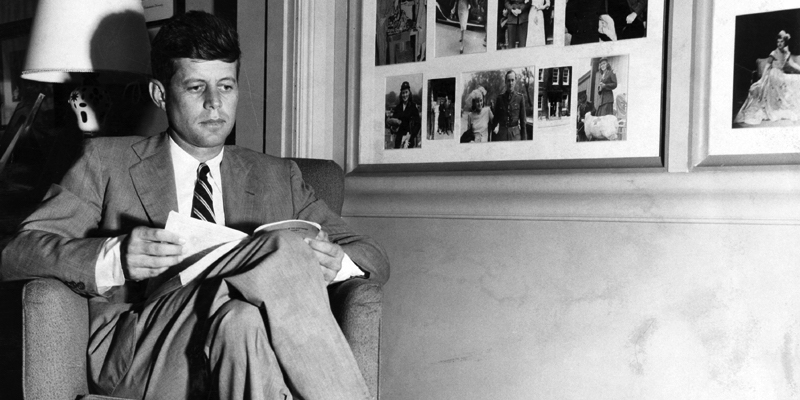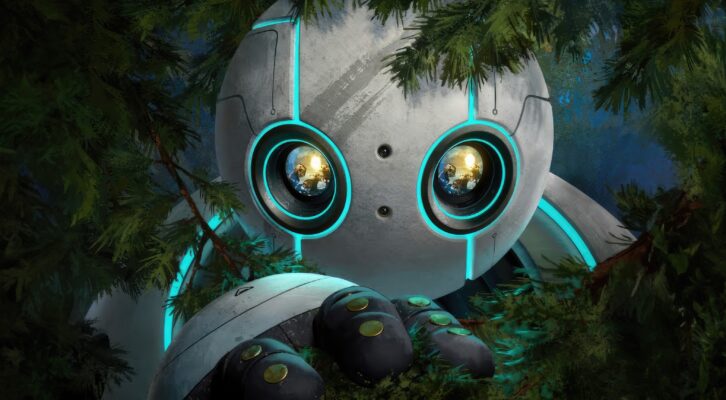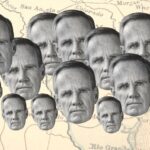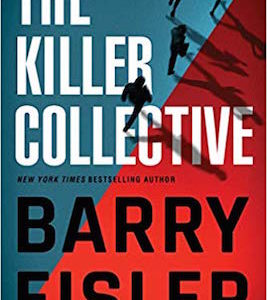Not many of our earliest presidents went in for crime literature. Shakespeare and philosophy were the order of the day, or anyway that’s what our leaders claimed to be enjoying in their private time. As the nineteenth century rolled into the twentieth, and as crime and suspense writing became more and more prevalent, a few commanders-in-chief even felt the need to comment on the phenomenon, writing it off as a guilty pleasure, a literary degradation, or, for those puritanical few, an immoral and shameful practice that ought to be suppressed at all costs. All that changed with Woodrow Wilson. Wilson’s political legacy is fraught to say the least (see—implementation of segregation in the federal government), but if there’s one area he set a positive example for future generations of leaders, it was in unabashedly reading and supporting crime fiction. Wilson spent two terms championing the pleasure of pulp and mystery, which in turn allowed the next few presidents—Coolidge, Hoover, FDR, Truman—to own their appreciation of the genre without shame or stigma.
Ever since, presidents have been devouring crime fiction with varying degrees of intensity. After all, we can’t expect all US leaders to be as obsessed as WW or Bill Clinton, who has not only confessed to a full-on mystery addiction, but has co-written his own thriller, The President is Missing, with James Patterson.
Might there be a special aisle-crossing quality—something universal and unpretentious—to the inner-cravings for a good mystery? Can we draw a line between crime fiction aficionados and bipartisanship? We’ll leave you to make the political determinations this Presidents’ Day. Here’s a helpful guide to our country’s presidents as thriller readers.

Donald Trump
In a 2016 interview with Michael Wolff, Trump called the war epic, All Quiet on the Western Front, “one of the greatest books of all time.” And while he flaunts his illiteracy (“I don’t have the time”), he has endorsed various titles that include his name and books by Fox News and Breitbart “writers.” When it comes to movies, his taste unsurprisingly tends toward mobster/bully flicks (Goodfellas, The Godfather, The Good, The Bad, and the Ugly), and his self-proclaimed favorite is Bloodsport, an ultra-violent martial arts movie about a US vet who goes to Hong Kong to fight.

Barack Obama
Our first President to influence pop culture across genre and form, Obama has continued to release his year-end lists of books, movies, and music, a tradition he began in the Oval Office in 2015. While he may favor literary fiction, he has not failed to tout psychological thrillers like Gone Girl and The Girl on the Train, and gritty social crime drama, Lush Life. He is also a Graham Greene fan, and has cited The Quiet American and The Power and the Glory high on his list of books most significant to him.
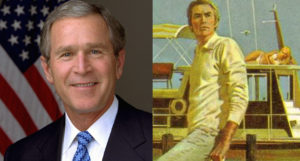
George W. Bush
Before 45 rewrote the rules, Bush Jr. may have been the least literary president to date. But maybe his Joe Six-pack persona was a PR job; in 2008, Karl Rove wrote an op-ed claiming Dubya read 186 books over 3 years, including eight of John D. MacDonald’s Travis McGee novels, Vince Flynn’s Mitch Rapp series, Next by Michael Crichton, and Point of Impact by Stephen Hunter. This healthy dose of crime is complemented by an annual reading of the Bible. It doesn’t seem like the White House cinema was often used for entertainment purposes, but rather, to inform military strategy via war movies (Black Hawk Down, We Were Soldiers), as well as to rehearse speeches.

Bill Clinton
Our mystery-writer-President! And while not all attempts pan out, Clinton is a bibliophile through and through; as one of our best-read presidents, he’s a true fan of crime fiction, a patron of DC’s now defunct MysteryBooks, and a major supporter of his favorite writers: Dennis Lehane, Walter Mosley, Sara Paretsky, and more. At the start of his presidency, he said he read two literary or nonfiction books for each mystery, a ratio that inevitably slid to one-for-one. He also reportedly screened High Noon 17 times at the White House.

George H. W. Bush
Like son, like father, thus not a bibliophile, per say, but he loved “Murder, She Wrote,” starring Angela Lansbury as Jessica Fletcher, a mystery writer and amateur detective. Some surmise this affinity had to do with the proximity of the fictional Cabot Cove to his summer home in Kennebunkport, Maine (and there’s nothing like murder to remind one of vacation), but I think it’s safe to say HW just loved cozies.
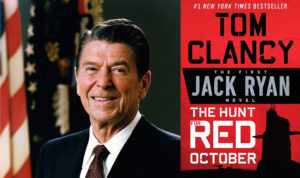
Ronald Reagan
While by no means a bookworm, he was credited with launching espionage-writer Tom Clancy’s career with one word: “unputdownable.” The Hunt for Red October, the first novel to be published by the US Naval Institute Press, was “[his] kind of yarn.” Movie-wise, Reagan also loved High Noon, as well as It’s a Wonderful Life, which we all know is noir incarnate; he reserved his own filmography for the most special occasions (his birthday).
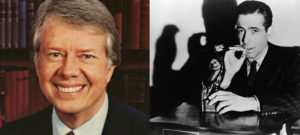
Jimmy Carter
The film buff screened a whopping 480 movies at the White House over a single term, averaging 2-3 movies a week. He inaugurated the White House cinema with the Watergate thriller, All the President’s Men, just two days into his presidency. His eclectic viewing included classic mysteries, from To Catch a Thief to Harper, crime movies like The French Connection and For a Few Dollars More, and a healthy Humphrey Bogart retrospective. And while he was also an avid reader (3-4 books a week, 2,000 words a minute), we cannot confirm or deny a particular love for crime fiction.
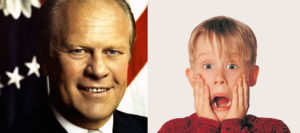
Gerald Ford
Not known as a reader, but he liked detective TV like “Murder, She Wrote” and “Cannon.” And his favorite movie (released after he was in office) was Home Alone, a strange and somewhat endearing choice for a grown-up president, but nonetheless, the burglars and the solitude and the bleak New York winter all point to the noir in Ford’s heart.

Richard Nixon
Though lonely and disgraced as a leader, there’s no denying the man was a reader (but don’t get him confused with an intellectual). And while he didn’t talk much about crime fiction, the genre couldn’t have been too unfamiliar given his legacy. Perhaps he was informed by Kojak, his favorite no-bull-shit detective who roamed the gritty streets of 1970s NYC, not afraid to bend some rules or break some balls.
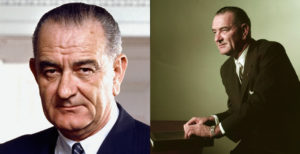
Lyndon B. Johnson
Our nation’s most popular nonreader? Did he like crime fiction? We can only speculate. He certainly didn’t care for movies, save a 10-minute homage to himself, which he screened time and again, sometimes consecutively.
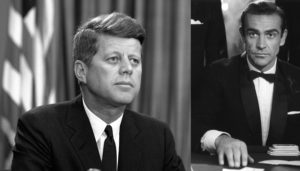
John F. Kennedy
It comes as no surprise that the suave and sexy leader was a 007 fan. After the Cuban Missile Crisis, he famously said, “It would have been better if we had left it to James Bond.” JFK also loved John Buchan’s thrillers, considered Casablanca his favorite movie, and was famously tied to mobsters throughout his career—very noir.
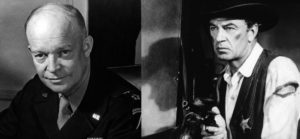
Dwight D. Eisenhower
A reader, sure, but perhaps more accurately, a “grazer,” Eisenhower dabbled in crime fiction, but let his true colors shine in the cinema. With over 200 movies logged, Eisenhower was the first president to really break in the White House family theater. He was obsessed with Westerns, especially the presidential favorite, High Noon.
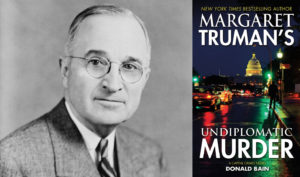
Harry Truman
A prolific reader, Truman and his wife both loved a good detective story; the couple had mystery in the bloodstream, and the penchant must have multiplied in their daughter, Margaret Truman, who wrote a best-selling series of her own murder mysteries, Capital Crimes. Not to mention the 33rd president’s favorite movie, John Ford’s great western (centered around a murder and a robbery), My Darling Clementine, starring Henry Fonda.
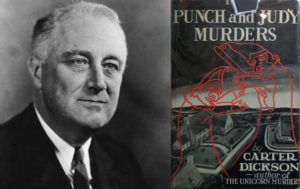
Franklin D. Roosevelt
While not a man who screamed his love of detective stories from rooftops, the book on his bedside table on the afternoon of his death was The Punch and Judy Murders, by John Dickson Carr. I’d bet whodunits grace many a deathbed.

